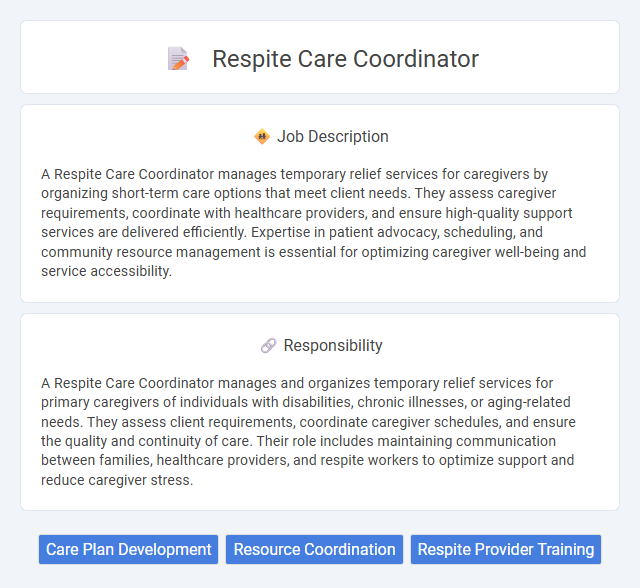
A Respite Care Coordinator manages temporary relief services for caregivers by organizing short-term care options that meet client needs. They assess caregiver requirements, coordinate with healthcare providers, and ensure high-quality support services are delivered efficiently. Expertise in patient advocacy, scheduling, and community resource management is essential for optimizing caregiver well-being and service accessibility.
Respite care coordinators likely require strong empathy and organizational skills to effectively support individuals with disabilities, chronic illnesses, or aging-related conditions. Those comfortable managing diverse care needs and coordinating between families and care providers may suit this role best. Individuals who thrive under pressure and excel in communication might find this position particularly fitting.
Qualification
A Respite Care Coordinator requires a background in social work, nursing, or healthcare administration, often holding a bachelor's or master's degree in these fields. Proficiency in care planning, case management, and knowledge of community resources is essential for effective coordination. Strong communication skills and experience in working with diverse populations enhance the ability to arrange temporary relief for primary caregivers efficiently.
Responsibility
A Respite Care Coordinator manages and organizes temporary relief services for primary caregivers of individuals with disabilities, chronic illnesses, or aging-related needs. They assess client requirements, coordinate caregiver schedules, and ensure the quality and continuity of care. Their role includes maintaining communication between families, healthcare providers, and respite workers to optimize support and reduce caregiver stress.
Benefit
A Respite Care Coordinator likely improves family well-being by organizing temporary relief for primary caregivers, reducing stress and burnout risks. They probably enhance service efficiency through tailored respite plans, ensuring timely and appropriate support. This role may contribute to better care quality by facilitating smooth transitions and consistent monitoring of client needs.
Challenge
Respite care coordinators likely face the challenge of balancing diverse client needs with limited resources, which may impact service quality and availability. Managing timely scheduling and matching caregivers to clients probably requires strong organizational skills and adaptability. Communication complexities with families and healthcare providers might also pose ongoing difficulties in ensuring seamless care delivery.
Career Advancement
Respite care coordinators play a crucial role in organizing short-term relief services for caregivers, which enhances their leadership and case management skills. Gaining expertise in client assessment, scheduling, and resource allocation opens pathways to senior care management or healthcare administration roles. Advanced certifications and experience in healthcare policies further accelerate career progression within the social services and healthcare sectors.
Key Terms
Care Plan Development
Respite care coordinators specialize in Care Plan Development by assessing client needs and creating personalized support strategies to ensure temporary relief for primary caregivers. They collaborate with healthcare professionals, family members, and service providers to design tailored care plans that maintain continuity and quality of care. Effective care plan development by respite care coordinators enhances caregiver well-being and supports client stability during short-term care periods.
Resource Coordination
A Respite Care Coordinator specializes in resource coordination to ensure families and caregivers receive timely and appropriate respite services. They manage schedules, connect clients with qualified providers, and navigate community resources to optimize care continuity. Effective coordination improves client satisfaction and reduces caregiver burnout by streamlining access to support networks.
Respite Provider Training
A Respite Care Coordinator specializing in Respite Provider Training develops and implements tailored educational programs to enhance caregiver skills and ensure compliance with industry standards. They assess training needs, monitor provider performance, and facilitate workshops on client safety, emergency procedures, and tailored care plans. Expertise in program evaluation and continuous improvement fosters high-quality, reliable respite services for families and healthcare systems.
 kuljobs.com
kuljobs.com